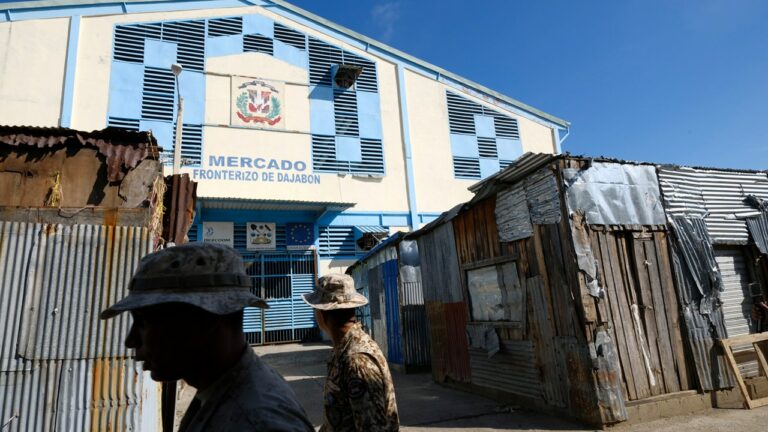Haiti Refuses to Reopen Key Border Crossing Amid Diplomatic Canal Dispute
Haiti decided not to join the Dominican Republic in reopening a crucial border crossing, causing a halt in trade and a prolonged diplomatic crisis over the construction of a canal on Haitian land.
The Dominican President, Luis Abinader, closed all borders, including the crossing at Dajabon in the northern Dominican city, for nearly a month to protest the canal’s construction. He claims the canal violates a treaty and will deprive Dominican farmers of much-needed water. Haiti argues that the canal is urgently required due to a drought.
On Wednesday, Abinader partially reopened the borders, including the one at Dajabon, which is a vital hub for commerce between the two countries. However, only limited trade resumed, and restrictions on Haitians entering the Dominican Republic for work, school, tourism, or medical reasons remained in place. Abinader also maintained a ban on issuing visas to Haitian citizens.
Why Did Haiti Say No?
Haiti declined to follow suit at its border in Ouanaminthe, and the reason wasn’t immediately clear. However, Moïse Charles Pierre, a delegate for Haiti’s northeast region, expressed that the Dominican side needed to apologize and restore full border operations.
“Abinader needs to respect the Haitian people and apologize publicly,” Pierre said.
At the same time, the other border gates at Elias Pina and Independencia have reopened on both sides.
Canal Dispute Takes Center Stage
The dispute over the canal was a focal point at an Organization of American States (OAS) meeting in Washington. There were sharp exchanges between Roberto Álvarez, the foreign affairs minister for the Dominican Republic, and Léon Charles, Haiti’s permanent representative to the OAS.
Charles stated, “The construction of the canal is not going to stop,” emphasizing that Haiti was open to dialogue but not “under the threat of dictating a solution to the Haitian population.”
In response, Álvarez brought up the history of Haiti’s 22-year occupation of the Dominican Republic in the 1800s and clarified that the Dominican Republic wasn’t resorting to violence over the canal dispute.
“We are not intimidating anyone. Our intention is to protect our border and our natural resources,” he said, criticizing Charles’s stance as “reckless.”
During the meeting, OAS Secretary General Luis Almagro offered to send a technical team with expertise in water resources and legal matters to examine the canal site. He also offered to facilitate a meeting between both sides.
The Canal’s Purpose and Concerns
The canal in Haiti is intended to divert water from the Massacre River, which runs along the shared border of the island of Hispaniola, to benefit both countries. Haiti’s government asserts that farmers urgently need this water to combat a drought that has devastated crops in the region.
Abinader argues that the canal’s construction violates a 1929 treaty and would negatively impact local farmers and nearby wetlands.
On Thursday, former Haitian prime minister and presidential candidate Claude Joseph denied allegations by a Dominican ambassador that he ordered the canal’s construction to provoke a crisis with the Dominican Republic. However, Joseph insisted that Haiti has the right to build the canal.
Trade Limitations and a Marketplace Fire
Since the partial reopening on Wednesday, vendors on the Dominican side are restricted to selling essential goods like food and medicine. They are prohibited from selling construction materials like concrete and metal rods because it could aid the canal’s construction.
Pierre, the Haitian official, mentioned that authorities are working on a plan to help Haitian vendors recover their goods stuck in the Dajabon marketplace since the closure. A fire erupted in the marketplace, destroying 26 of 28 stalls belonging to Haitians. The cause of the fire is under investigation.
Closing Thoughts
The diplomatic canal dispute between Haiti and the Dominican Republic continues, affecting trade and border crossings. The situation remains complex, with both sides maintaining their positions. It is still uncertain when and how this dispute will be resolved.

